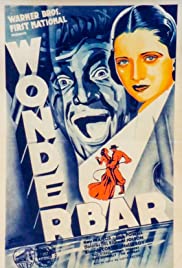
WONDER BAR
US, 1934, 84 minutes, Black and white.
Al Jolson, Kay Francis, Dolores del Rio, Ricardo Cortez, Dick Powell, Guy Kibbee, Ruth Donnelly, Hugh Herbert, Louise Fazenda, Fifi D'Orsay.
Directed by Lloyd Bacon.
Wonder Bar is a strange and exotic musical. For film historians, it is a very interesting example of film-making before the establishment of the Hayes Office and the Motion Picture Code. The story and the behaviour of the characters is quite amoral and would not have been permitted in years soon after its production.
The film is set in one of those '30s cabarets, so beloved by later decades, in 1930's Paris. It is presided over by Al Wonder, Al Jolson doing his singing and acting turn. The film introduces a wide range of characters briefly and then has thew all present at the Wonder Bar during one evening. The film is in black and white, is crisply-paced, uses the personalities of its stars to get things moving. The choreography and musical numbers were staged by Busby Berkeley and are typical of his work at Warner Bros. at this time - full of special effects, camera angles. There is also an exotic brief flamenco dance with actual whip danced by Ricardo Cortez and Dolores del Rio. The climax of the film is a long number 'Heaven on a Mule' (which was cut by censors in various countries and by television stations until more recent times). It is an imaginative fantasy with Jolson in blackface, going to a black heaven with crowd sequences, exotic art styles and comic 'worldly' kind of heaven.
1. The impact of this musical in its time? A black comic musical? Amoral? Typical of the '30s or not? Impact for later generations?
2. Black and white photography, the American studios trying to suggest Paris? The Wonder Bar itself, its patrons, costumes and decor? The musical numbers? Busby Berkeley's imaginative style? The flamenco with whip? The production values of 'Heaven on a mule', its lavish production style?
3. The title and its reference to Al Wonder? Its irony? People relying on the Wonder Bar - but it did not do wonders? The mat being unrolled and rolled up at the end?
4. The moral standards of the film (in the light of '30s film-making)? Al and his attitudes towards his patrons? His behaviour as regards Harry's death and the disposal of the body, using the German officer's suicide? His relationship With Inez? With his persuading Madame Renaud to go back to her husband - so that his patronage would not be lost and have an effect on Wonder Bar? Inez and her passion for Harry, the flashing of the whip, her stabbing him during the dance - and almost immediately forgetting that he ever existed? Harry and his being a gigolo, leading on Inez, leading on Madame Renaud? Stealing the jewellery, getting money from Al? His seeming complicity in his own death? The attitude of the German officer who lost all his money to have a night on the town and then commit suicide. The wealthy Americans on the town in Paris trying to pick up the girls and deceive their wives? The middle-aged wives flirting with a gigolo and ringing him to request their spending the night? The French businessmen and their entertainment at the Wonder Bar? M'sieur Renaud not believing that his wife could have an affair? The fact of her
affair? The overall atmosphere of the interaction of these characters?
5. The sketch of Al - his dream with Inez present? His love for her? The management of the club? The host? Al Jolson's musical numbers? His buying off Harry with the stolen jewellery? His getting rid of Harry's body? Allowing Inez to go with Tommy?
6. Inez and her passionate love for Harry, her being obsessed with him, her disgust at his behaviour with Madame Renaud, her seeming emotional unbalance, the performance with the whip, her taking the knife and killing Harry during the dance, her being consoled by Tommy?
7. Tommy - Dick Powell and his singing, leading the band, love for Inez, support of Al? (The only ordinary person in the cast?)
9. Harry and his being a gigolo, the good reviews of his performance with Inez in the cabaret? The liaison with Madame Renaud? Trying to avoid the two women in the bar? Getting money for the stolen Jewellery? Leaving? His death?
9. Kay Francis as Madame Renaud, her lies to her business executive husband, the complicity of her maid, the liaison with Harry, going out into his car to go away with him, Al persuading her to return and showing her the truth about Harry, the return of her jewellery, reconciliation with her husband? Her husband and his involvement in business and neglecting his wife?
10. The two ageing American businessmen and, their being drunk? picking up the girls, trying to arrange for their wives not to know? The middle-aged wives and their similar behaviour? The notes with the gigolo? Their phone calls?
11. A comment on behaviour? Moral stances? Did they come credibly together in this 84-minute musical?